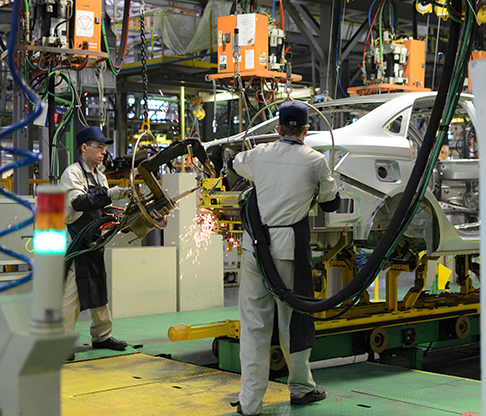Cloud-ready
data processing
400
data catalogs completed
Improved
data quality and traceability

SUBARU adopted Informatica’s cloud data integration service to enable cross-departmental management of product lifecycle data, from car development and manufacturing to sales and maintenance. Now, enhanced car quality drives higher productivity and customer satisfaction.
“With the help of Informatica, we are able to connect, integrate and strengthen our data linkage as early as technical development and design stages, and thus improve the quality of our car manufacturing,”

Combatting data silos in the auto product lifecycle
SUBARU, the leading Japanese automobile manufacturer, operates a global business and transportation equipment supply chain, which can lead to challenges in data management and utilization. Within the company, information systems for each business operation such as development, procurement, manufacturing, sales and maintenance were often siloed, making it difficult to coordinate data across departments. This could impact the quality of car manufacturing and customer service.
“The most urgent issues were quality response tasks such as recalls and service campaigns,” says Kentaro Ichikawa, Head of the Data Management & Utilization Division. “Events confirmation, cause analysis and impact investigation were challenged because each dataset was isolated and there was no company-wide control. Additionally, there was still a prevailing attitude within the company that data owned by a department was solely theirs.”
“Traditional methods of system integration took a lot of time and cost, and we anticipated facing the same issues time and again. Therefore, we decided to focus solely on connecting data and establishing a company-wide data integration platform.”
From manual integrations to automated connections
To resolve issues stemming from the fragmented data management landscape, SUBARU decided to centralize and accurately trace data occurring at every stage from car development and production to after-sale maintenance. This project, named “global PLM (product lifecycle management),” has two missions. First, to “resolve issues as quickly and minimally as possible.” This includes a system that uses real-time data to accurately identify what problems have occurred in which vehicles and facilitate rapid actions to customers. Second, to “improve inherent quality,” by enhancing the car manufacturing process with stronger connections between data from the initial stages of product planning, technical development and design.
Ichikawa explains the policy change needed to achieve these goals: "Traditional methods of system integration took a lot of time and cost, and we anticipated facing the same issues time and again. Therefore, we decided to focus solely on connecting data and establish a company-wide data integration platform."

The company had traditionally operated several individual systems in departments like development, manufacturing or sales. “To create a data integration platform, we needed to organize all the data managed in each system,” says Ichikawa. “Simply aggregating and connecting them would result in contaminated data. Therefore, we designed the optimal data placement and connection schema for the entire company."
With its new conceptual data model, the team implemented an approach to prioritize, acquire and integrate data. “Part Number” became the key for car planning and development, “VIN (Vehicle identification number)” for supply chain and mass production and “Customer ID” for the CRM where car sales are logged. As Ichikawa sums up the effort: “Using these three keys as the framework, we built a foundation that chains the entire company's data like branches and leaves."

Easy data processing, without the need for code
In the initial phase of the project, SUBARU considered combining on-premises products for its data integration solution. However, the difficulty in adapting to environmental changes after deployment was a bottleneck of on-prem, leading to the decision to build in the cloud. Even then, many cloud services with a plethora of features required extensive coding for data integration processes, which could lead to suboptimal customizations and lower maintainability.
After evaluating various no-code software products, the company chose Informatica Intelligent Data Management Cloud (IDMC). Its main reasons were IDMC’s long-standing position as a market leader, a robust partner ecosystem in Japan that supports numerous implementations, the availability of all its rich features under one flexible IPU-based consumption model, and the ease of data processing standardization due to its no-code platform. With its focus on data integration, IDMC enables many data processing tasks with a limited number of transformations.
Ichikawa particularly valued how easy it was to establish internal rules during parameter selection and design implementation. For the mission of SUBARU’s global PLM project, it was crucial that the gathered data and its subsequent transformations could be accurately tracked via a graphic user interface (GUI).
"By chaining product lifecycle data with customer IDs and organizing it all cross-departmentally, we have met and surpassed the missions of our global PLM effort,” says Ichikawa. Due to implementing the new data integration platform, approximately 400 data assets have been cataloged. SUBARU plans to expand the use of this platform among all employees for daily operations.
Data lineage was another essential requirement for SUBARU. The team also adopted Enterprise Data Catalog (EDC) to automate and visualize lineage information and bridge it to business intelligence (BI) tools.
Improving car quality and employee productivity
The new data integration platform supporting SUBARU's global PLM allows for standardized data processing without the need for coding, covering every phase from car development and manufacturing to sales and maintenance.
This improved process has had a snowball effect across the business. Miho Kato of the Data Management & Utilization Division, explains, "The quality of the car-making process and the quality of data handled by employees are reflections of each other. Our new data infrastructure not only enhances the accuracy of work for employees but also motivates them to improve productivity. In fact, we’ve seen an increase in enquiries from various departments about cross-functional utilization methods for data sets extracted from multiple systems."
Moreover, SUBARU's management has found the cloud-based platform provides a return much greater than anticipated against the investment. Ichikawa sees greater opportunity ahead: "In the future, we’ll explore building systems that apply generative AI to make even more effective use of this data integration platform." Aiming to be at the global forefront in data-driven manufacturing innovation and value creation, the leading automaker will continue to expand its capabilities powered by Informatica, supporting a multifaceted future-ready data strategy.

Inside the solution
Intelligent Data Management Cloud
Cloud Data Integration
Data Catalog
More Success Stories

Yamaha revs business in the cloud

Holiday Inn Club Vacations finds customer data paradise

KLA moves 12 years of data to the cloud in one weekend with Informatica
Learn more about Informatica Intelligent Data Management Cloud and our manufacturing solutions





